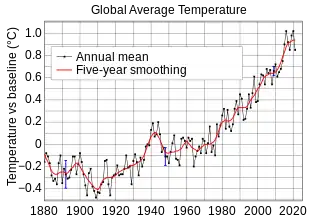2 degree climate target
The two degree target is the international climate policy goal of limiting global warming to less than two degrees Celsius by 2100 compared to the pre-industrialization level. It is an integral part of the Paris climate agreement.[1] This objective is a political determination based on scientific knowledge concerning the probable consequences of global warming, which dates from the Copenhagen Conference in 2009.[2] It is criticized as insufficient,[1][3] because even a warming of two degrees will have serious consequences for humans and the environment, as demonstrated in particular by the IPCC Special Report on the consequences of a global warming of 1,5°C.

Emission trajectories needed to achieve the Paris Agreement's two-degree target without negative emissions, depending on the emission peak.

Evolution of land and sea temperatures 1880-2020 compared to the 1951-1980 average.
See also
References
- Damian, Michel (18 May 2016). "Limiter le réchauffement de la planète à 1,5 °C ? La question qui brûle" [Limit global warming to 1.5°C? The burning question]. The Conversation (in French). Retrieved 22 August 2018..
- Report of the Conference of the Parties on its fifteenth session, held in Copenhagen from 7 to 19 December 2009 (PDF) (Report). United Nations Framework Convention on Climate Change. 30 March 2010. Retrieved 9 November 2022.
- Pérez, Eddy (13 August 2021). "Climat : le rapport du GIEC est bouleversant. Il est maintenant temps d'agir" [Climate: the IPCC report is shocking. Now is the time to act]. The Conversation (in French). Retrieved 22 August 2022..
This article is issued from Wikipedia. The text is licensed under Creative Commons - Attribution - Sharealike. Additional terms may apply for the media files.